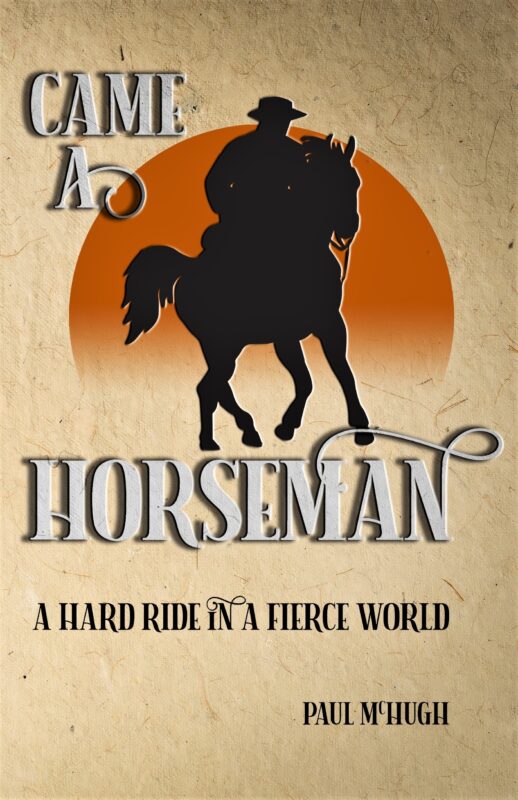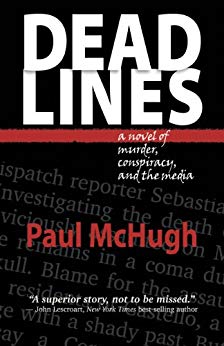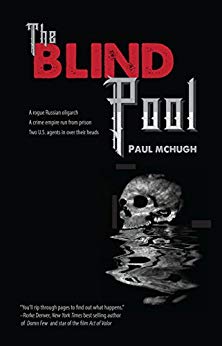Irina Barnes left, the author center, Grant Barnes right, about a half-century after we all met for our very first time.

The myth of the solitary artist is exactly that—a myth.
That’s not to say that spending many lonesome hours can’t be a part, at times even a gigantic part, of your craft. But achieving success at anything in life inevitably turns into a collective enterprise. No one individual can produce significant art or anything else while lacking all aid.
Or maybe, if some prodigy can do it a time or two, I’d bet you a cookie he or she can’t keep it up for long.
Other than pen and paper, the most essential requirement of a writer is at least a few good friends. Their nurturing inputs may be many and varied, from demonstrating sheer belief in you and what you’re struggling to do, to far more simple and practical measures, such as providing a cup of coffee, a burger, or a place to flop when you really need these things.
In my life and career, I’ve been blessed with a number of relatable and reliable friends. It’s definitely no exaggeration to say that I wouldn’t have made it even this far without their unfailing assistance.
CARESS OF YOUR KARASS
Two early and important friends have been Grant and Irina Barnes.

I met her first. I was in line at the cash register for the Student Art Museum at UC Berkeley, making a purchase while I flirted with the bookstore’s pretty redheaded cashier. Suddenly, I felt the strong beam of a psychic presence, drilling me smack in the back of my head. You know what it’s like, when you literally can feel someone staring at you?
I’ve no grand or scientific explanation for this, other than some sub-atomic “entanglement” or “spooky action at a distance” function boosted up to fully human scale. Perhaps the Buddhists come nearest to concocting a convincing rationale when they claim that All is Mind.
Anyhow, I turned around to see an “older” woman (she was only 38, but you have to understand, back then I was just 22!) regarding me with a flinty, steady and speculative eye. She’d just emerged from a back office and seemed determined to assess whether I posed a threat to her cashier. Well, that redhead might’ve been cute, but this other lady was a force. So, I walked up to her and introduced myself. She proceeded to astutely quiz me about who I was and what I presumed myself to be up to.
SPINNING MY YARN

Amid that interrogation, she discovered that I’d just ridden my motorcycle to California from Florida a month before, that I had begun work on a novel based on that adventure, and that I’d stopped by UC Berkeley and its most accessible museum to take a break and cheer myself up. See, I’d long nursed a fantasy that I could work as a brakeman on western railroads as Jack Kerouac and Neal Cassady once had done, while scribbling on my doubtless brilliant manuscript during my time off. But when I’d reached the union hall in Oakland just a few hours earlier, the signalmen there had taken a single glance at my leather pants, long hair and Fu Manchu mustache, and proceeded to laugh me out of the place.

After I finished that narrative, Irina invited me to come to her home for dinner that evening.
Free chow? Yow! Irresistible. Plus I felt rather intrigued and wanted to find out more about this singular personage. I wrote down the address of her home on Prince Street in my pocket notebook, and a few hours later found my way there.
A FULL HOUSE

Turned out, her husband Grant was director of the U.C. Berkeley Press, and their dinner on that evening was a party for assorted faculty and authors signed up for publication. Well, I did enjoy absorbing big doses of food and wine. However, chit-chat with yet more academics didn’t figure as a very strong draw. I’d recently spent years doing a ton of that back in Tallahassee.
Far more fascinating to me were Grant and Irina’s three bright and energetic kids: Ted, Scott, and Marian. I suspect I came across as a bit of an exotic creature to these youngsters, because they wanted to play with me. What they had in mind was card games. Well and good. Those kids didn’t know anything about poker, so I taught them. We played using tiny pocket-change antes, but still, by the end, I’d utterly cleaned them out of their allowances. And I kept it all, too! Which was the best poker lesson on offer that night.
Perhaps it wasn’t the best policy for currying favor with my hosts, however. Yet thankfully, Grant and Irina were both much more amused than annoyed by the episode.
PURSUE PEAK EXPERIENCES

Afterward, and throughout all the many ensuing years, our friendship has only deepened.
Probably the biggest favor they ever conferred was taking me seriously. Despite a lack of evidence that I would be heading anywhere significant in my writing career, or indeed would ever arrive at one, they steadily encouraged and supported me on my path. Whenever I was in the Bay Area, I knew I could count on Irina for “two hots and a flop”—which meant great food, free use of a bed, and many hours of interesting conversation.

Beyond that, I learned a lot just by watching these highly accomplished folks lead their lives. Irina always seemed willing to reinvent herself and tackle a fresh project, such as creating a storefront museum focused on Oakland’s recent urban history. In addition to running a famed university press, Grant was an athlete and mountaineer of no small skill. Although some 20 years older than me, the guy could run my legs off on any day of the week. He set a resonant example for me by summitting on Denali for his 50th birthday. (I sought to meet that bar decades later by kayaking the Grand Canyon to celebrate my own 50th.)
THE WELL OF WILL
Grant and Irina steadily proved to me that willpower plus imagination could create opportunity, whether it was Grant deciding in mid-life that it was high time to become a pilot, or Irina choosing to go on an archeological dig in Greece for a perfect summer vacation.

Steady feedback on my writing was a constant theme of our relationship. Neither ever demonstrated any dearth of opinions. Quite the opposite. Grant in particular had the critical chops to either approve, damn with faint praise, or excoriate my efforts with a precision that left no doubt that I had room for improvement. He also generously indicated the many vectors along which this vast terrain might be found.
They always remained cheerful and supportive, regardless of the personal or professional challenges I faced. I have loyally sought to return that favor as much as I can. And I didn’t and won’t and don’t draw the line anywhere.
Except when it comes to giving them an honorable citation on a page of the author’s Acknowledgements!
You know whereof I speak: that page (or pages) at the end of many a book wherein the author pontificates, usually in tedious detail, on how many readers, editors, and agents were involved in ushering the work to its state of near-perfection… the family members who endured all torments of the artist, whilst toting cheese-smeared bagels and steaming lattés to the harried keyboard pounder… the emotional support animals whose cool noses poking at knees and elbows helped nudge the last and most difficult pages to completion… the highly voluntary yet still crucial ministrations of a postman, the plumber, a local tinker, tailor, soldier, baker or candlestick maker. Etc., etc, etc. ad summam nauseam.
“ACK, ACK… ACK!” – Bill the Cat
I heartily loathe Acknowledgement pages for two principal reasons.
First, in the case of fiction, I feel it sabotages the storytelling. A quote from Mark Twain may be useful here. “”We have not the reverent feeling for the rainbow that a savage has because we know how it is made. We have lost as much as we gained by prying into that matter.”

I wish to believe that great stories spring from the collective unconscious like Athena from the brow of Zeus. That both permits and encourages me to pay more psychic attention to the result. I much prefer a story that has the mists of an oracle still clinging to it. To learn instead, in no uncertain terms, that the thing I’m reading actually was the product of a committee seeking to maximize its sales potential, a complex process for which a putative author feels effusively grateful, well, I feel that detracts in a rather severe way from my experience as a reader.
Next, I strive with might and main to prevent it from infecting any of my experiences as a writer.
(Let me point out here that I don’t feel at all the same way about nonfiction books, pro journals, academic papers and the like. Here, to acknowledge sources and provide full credits and references is appropriate; it bolsters the reliability of the information as well as the careers of contributors.)
COIN OF THE REALM
My other reason for hating Acknowledgment pages in fiction is that in no way can any part of it ever do adequate justice to all the support that went into creating a work. When people like the Barneses have helped love you and your art into being over decades, well, that can’t be paid back with a mere honorable mention. Not hardly. Offering that is only a sop tossed into a gaping chasm where a much more appropriate and massive tribute has been l-o-n-g overdue.
If you are a writer, and you’ve been blest enough to find good friends who help you to write, the best—maybe the only— thing you can ever truly do to repay them is to love them right back. Directly. And in person. Forever.








